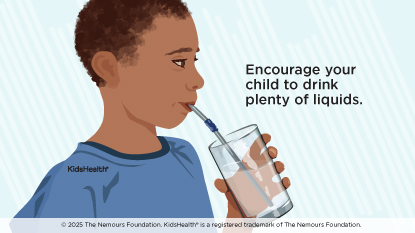When kids vomit (throw up), it is often caused by a virus (a type of germ) and lasts only a day or two. Giving your child an oral electrolyte solution (such as Pedialyte®, Enfalyte®, or a store brand) as recommended by your health care provider, will help you make sure your child doesn't get dehydrated (not have enough water in the body). You can buy the oral electrolyte solution at drugstores or supermarkets without a prescription.
Here's how to care for your child.


Giving Liquids
Starting Food
Medicines

Your child:

Your child:
You know your child best. If your child has symptoms that worry you or seems very sick, call your health care provider or take your child to the ER.

How can we prevent viruses that cause vomiting from spreading? To help prevent the spread of viruses and other germs, teach all family members to wash their hands well and often. They should wash for at least 20 seconds with soap and water. Clean tabletops, doorknobs, and other hard surfaces with a cleanser that kills viruses. Keep your child out of childcare, school, and activities until 24 hours have passed with no vomiting.
How do oral electrolyte solutions help keep a child hydrated? These solutions contain a balanced mix of water, electrolytes (sodium, chloride, and potassium), and sugars (glucose). They replace the liquids and electrolytes that a child loses through diarrhea or vomiting. The solutions help prevent or treat dehydration and keep the body's electrolytes balanced.
Why does vomiting happen in kids? Vomiting in kids is often caused by a virus. The viral infection may also cause diarrhea and fever. Vomiting also can happen from food allergies, food poisoning, certain medicines, gastroesophageal reflux (when liquids from the stomach flow backward up into the mouth), or, very rarely, a blockage in the intestines.
Does my child need an antibiotic? Since viruses are the usual cause of vomiting in kids, an antibiotic won't help your child. Antibiotics treat infections caused by bacteria, not viruses.